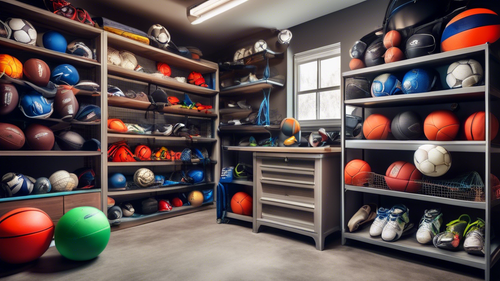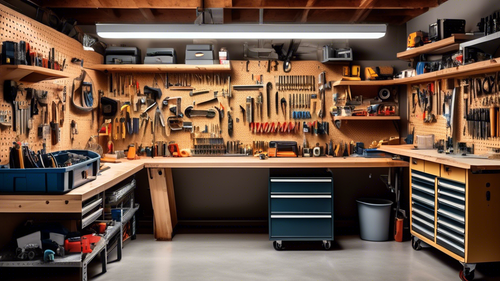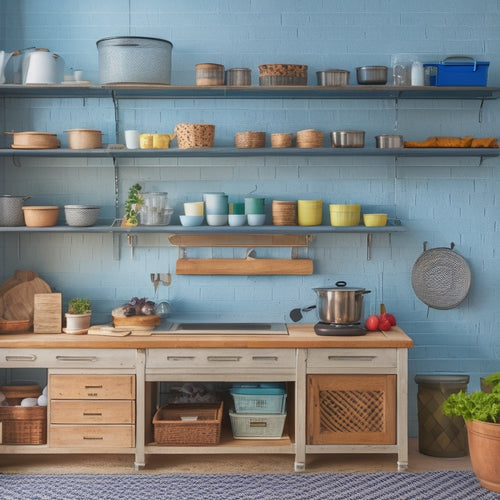
Battle of Chaos: Clutter Vs. Organization Unveiled
Share
You're about to step into the ultimate battleground: the war between messiness and order, where the fate of your mental and emotional well-being hangs in the balance. Messiness, not just a disorganized space, is a mental health issue that can lead to anxiety, depression, and shame. On the other hand, order is a system that works for you, creating a space that improves focus, reduces stress, and boosts productivity. Understanding the difference between messiness and hoarding is vital, as recognizing your struggles is the first step towards change. As you set out on this journey, you'll uncover strategies to overcome messiness and reveal the secrets to a more fulfilling life ahead.
Key Takeaways
• Clutter refers to any item out of place, while organization involves assigning designated locations and systems to maintain order.
• Hoarding disorder is a serious mental health condition that can lead to shame, anxiety, and depression, but professional help can overcome it.
• Maintaining an organized space improves focus, reduces mental fatigue, and promotes relaxation, leading to a more fulfilling life.
• Clutter sabotages mental and emotional well-being, fuels anxiety and stress, and impairs mental clarity, making it essential to declutter regularly.
• Effective organization strategies include regular decluttering, efficient workspaces, and daily habits to maintain control and boost productivity.
Understanding Clutter and Organization
As you stand amidst the chaos, understanding the fundamental difference between clutter and organization is vital: clutter refers to any item out of place, whereas organization involves assigning designated locations and systems to make sure everything has its rightful spot.
Clutter misconceptions often lead to disorganization, but recognizing that clutter isn't the same as hoarding is crucial.
Effective organization psychology involves creating a system that works for you, not against you.
By implementing decluttering techniques and organizing hacks, you can transform your space into a haven of productivity and calmness.
It's time to debunk the myths and get organized – your mental well-being depends on this.
The Hoarding Disorder Dilemma
One in five individuals struggles with persistent difficulty discarding possessions, characterizing the complex and often misunderstood issue of hoarding disorder.
You may think you're just holding onto sentimental items, but for those with hoarding disorder, it's a deeply ingrained emotional response. Hoarding misconceptions often lead people to believe it's just about being messy or lazy, but it's a serious mental health condition.
Here are some key things to keep in mind:
-
Emotional toll: Hoarding disorder can lead to feelings of shame, anxiety, and depression.
-
Treatment options: Professional assistance, such as therapy and organization services, can help individuals overcome hoarding disorder.
-
Seeking help: Don't be afraid to reach out for support; with the right treatment, you can learn to manage your possessions and improve your mental well-being.
Organization's Hidden Benefits
You'll be surprised to discover that maintaining an organized space can have a profound impact on your mental and emotional well-being, going far beyond just being able to find things quickly.
When your surroundings are clutter-free, you'll experience improved focus and reduced mental fatigue. Organization's hidden benefits also include stress reduction, as a tidy environment helps calm your mind and promotes relaxation.
You'll feel more in control, and your productivity will soar. By implementing organized systems, you'll enjoy better time management, allowing you to tackle tasks with ease and confidence.
As you maintain your organized space, you'll uncover even more hidden benefits, leading to a more balanced and fulfilling life.
The Dark Side of Clutter
Your cluttered space is secretly sabotaging your mental and emotional well-being, quietly fueling anxiety, stress, and procrastination. Clutter's negative impacts are far-reaching, affecting not only your productivity but also your overall quality of life.
Here are just a few of the clutter consequences you might experience:
-
Increased stress levels: Cluttered spaces can lead to higher cortisol levels, making it difficult to relax and unwind.
-
Impaired mental clarity: Clutter can cloud your judgment, making it harder to focus and make decisions.
-
Reduced productivity: Procrastination often results from clutter, as you struggle to find the motivation to tackle tasks amidst the chaos.
Strategies for Staying Organized
Develop a routine of regular decluttering sessions to prevent accumulation and maintain your hard-won organization. This will save you time and effort in the long run, allowing you to focus on more important tasks.
Implement time-saving tactics, such as designating a specific day each week for decluttering, to make the process more manageable.
Create an efficient workspace by assigning a home for each item, and use storage solutions like labels and bins to keep similar items together.
Establish daily habits, like putting away items after use, to maintain your organized space.
Overcoming Clutter Challenges
When clutter starts to creep back in, recognizing the signs and addressing the underlying issues driving the disorganization is essential to overcome clutter challenges effectively. You must identify the root causes, whether it's a lack of storage solutions, inefficient daily routines, or ineffective decluttering techniques.
To regain control, try the following:
-
Reassess your storage: Identify areas where you need more storage and implement solutions that work for you.
-
Establish daily habits: Create routines that promote tidiness, such as dedicating 10 minutes a day to cleaning.
-
Practice mental decluttering: Recognize the mental health benefits of organization and focus on maintaining a clutter-free space to improve your mental well-being.
Embracing an Organized Lifestyle
Having overcome clutter challenges, you're now poised to adopt an organized lifestyle that boosts your mental clarity, productivity, and overall well-being. By embracing minimalist living, you'll simplify your spaces and cultivate a decluttering mindset. This transformation will allow you to focus on what's truly important, freeing up mental energy for creativity and innovation.
Implementing productivity hacks, such as setting daily routines and labeling containers, will help you maintain your newfound organization. As you continue to refine your systems, you'll find that simplifying your surroundings has a profound impact on your mental health and relationships.
Frequently Asked Questions
Can a Cluttered Space Affect My Physical Health?
You're right to wonder if a cluttered space affects your physical health. Clutter consequences, like increased stress, can weaken your immune system, while clutter solutions, such as tidying up, can reduce hygiene risks and promote a healthier living environment.
How Do I Involve Family Members in Organizing Our Home?
You involve family members in organizing your home by encouraging collaboration, creating routines, and involving kids in decision-making; assign tasks, make it fun, and praise their efforts to foster a sense of ownership and responsibility.
Are There Any Organizing Apps That Can Help Me Stay on Track?
As you navigate the digital domain, you'll discover a treasure trove of organizing apps that'll help you stay on track, master time management, and streamline your daily routine, bringing order to your chaotic world.
Can a Professional Organizer Really Make a Significant Difference?
You'll be amazed at how a professional organizer can transform your space and habits, bringing significant benefits like increased productivity, reduced stress, and improved mental clarity, as seen in countless organization impact stories.
Are There Any Specific Organization Techniques for People With Adhd?
Imagine a treasure chest overflowing with hidden gems - that's what your organized space can feel like! For individuals with ADHD, visual aids like color-coded labels and time management tools like the Pomodoro Technique can help create structure and boost productivity.
Related Posts
-

Sports Equipment Organization for the Garage
Sports Equipment Organization for the Garage: A Comprehensive Guide As an avid sports enthusiast, I know firsthand...
-

Organize Your Garage Workbench
Organize Your Garage Workbench: A Comprehensive Guide Is your garage a disorganized mess, with tools scattered eve...
-

10 Budget-Friendly DIY Kitchen Space Hacks
You can release the full potential of your kitchen space without breaking the bank by incorporating creative, budget-...


